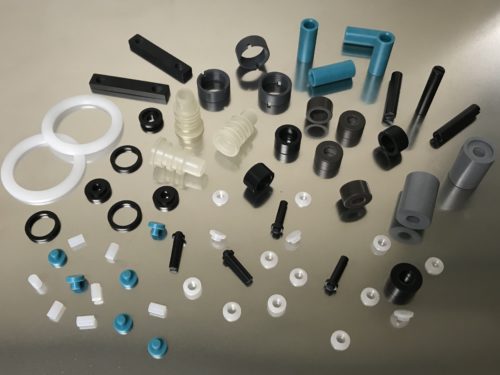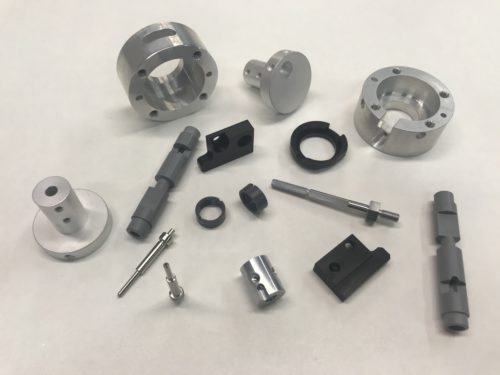Archives
Archive: Sep 2020
Choosing the Right Material for CNC Machining
Leave a CommentCNC machining is a manufacturing process that involves the removal of raw material using precision cutting tools to make a product or part. When choosing a material for CNC machining, there are numerous things that you must consider.
Asking the following questions can help determine which material most suits your needs:
- What application will the finished product be used for?
- What kind of dimensional tolerances are required?
- Does it need to be resistant to corrosion and extreme temperatures?
- How much operational stress and/or wear does it need to be able to withstand?
Metal
There are various types of metal that can be used in CNC Swiss Machining. They each offer their own advantages and disadvantages.
Aluminum
Aluminum is a popular choice as it offers strength and corrosion resistance, making it suitable for mechanical parts in industries such as automotive, aerospace, healthcare, and consumer electronics. Aluminum parts offer electrical conductivity, an ideal strength-to-weight ratio, anodization potential, and recyclability while ensuring a high level of machinability. However, aluminum is generally more expensive than other materials, and its oxide coating can damage tooling.
Brass
Brass parts and components are durable, easy to machine, cost-efficient and have high heat and corrosion resistance. Brass is also known to create a tighter seal for fittings. Brass machining is mostly used in the medical, electrical and fluid flow industries, along with various consumer products.
Bronze Alloys
Bronze offers benefits such as hardness, high ductility, thermal conductivity, workability, and strength. It is considered a low friction and non-magnetic alloy and is commonly used for products such as nuts, bolts, electrical terminals, threaded parts, bearings, , bushings, and screws.
Carbon Steel
Depending on the application, carbon steel can contain trace amounts of other metals and comes in a variety of grades, making it suitable for machining drive rods, drain line fittings, lifting plates, and latch plates. Carbon steel exhibits poor corrosion resistance and is typically coated with a finishing material to prevent degradation.
Copper
Copper is an excellent conductor of heat and electricity, making it suitable for electrical wiring, motors, construction, and industrial machinery. Copper can be difficult to machine and requires specialized processes for manufacturing. Copper alloys often replace pure copper to improve machinability, especially when performing intricate custom work with tight tolerances.
Iron
The fine-grained microstructure of iron acts as a built-in chip breaker and provides more uniformity when compared to other metals, meaning tools last longer and there are fewer discontinuities and defects. Iron is an ideal material for machining pistons, housings, bearings, rings, and other parts.
Stainless Steel
Stainless steel is commonly used in custom material processing, power generation, transportation, and other applications. Its self-repairing capabilities create resistance to scratches, water, rust, and corrosion. Stainless steel is often stress relieved to increase machinability and dimensional stability; however, stainless steels are generally more difficult to CNC machine.
Plastic
 Plastic materials can also be used in CNC machining. MF Engineering can produce custom-machined plastic parts from several different types of plastics based on your requirements and specifications.
Plastic materials can also be used in CNC machining. MF Engineering can produce custom-machined plastic parts from several different types of plastics based on your requirements and specifications.
Delrin
Delrin, also known as polyoxymethylene, is a popular thermoplastic because of its lubricity as well as its wear and impact resistance. Delrin is a stable material that can be machined within tight tolerances, making it ideal for producing stiff, low friction parts.
HDPE
HDPE, or high density polyethylene, is a great choice for subtractive CNC machining processes. It is a versatile thermoplastic polymer with a very high tensile strength and high impact resistance, making it suitable for plastic bottles, jugs, and commercial plastic pipes. UV-resistant HDPE materials are also common in the boating industry.
PVC
PVC plastic is a strong, durable, and lightweight material that is resistant to weathering, rot, corrosion, impact, and abrasion, making PVC an obvious choice for construction and outdoor applications.
Nylon
Nylon is commonly used in applications such as domestic appliances and automotive components. It is also an ideal material for custom machining bearings, insulators, and parts exposed to large amounts of water. Its low friction properties make Nylon easy to perform CNC milling.
Polycarbonate
Polycarbonate is a long lasting material that provides durability, good machinability, and high levels of resistance to breaking and cracking.
Other Materials
While metal and plastic offer many advantages for use in CNC machining, other materials can be machined as well. MF Engineering offers other materials, including fiberglass reinforced plastics, Teflon, and EVA foam.
Turn to MF Engineering for Your CNC Machining Needs
MF Engineering’s skilled team works with all of these materials to create high quality custom machined parts for applications in a variety of industries. To get started on your CNC machining project, contact us or request a quote today.


